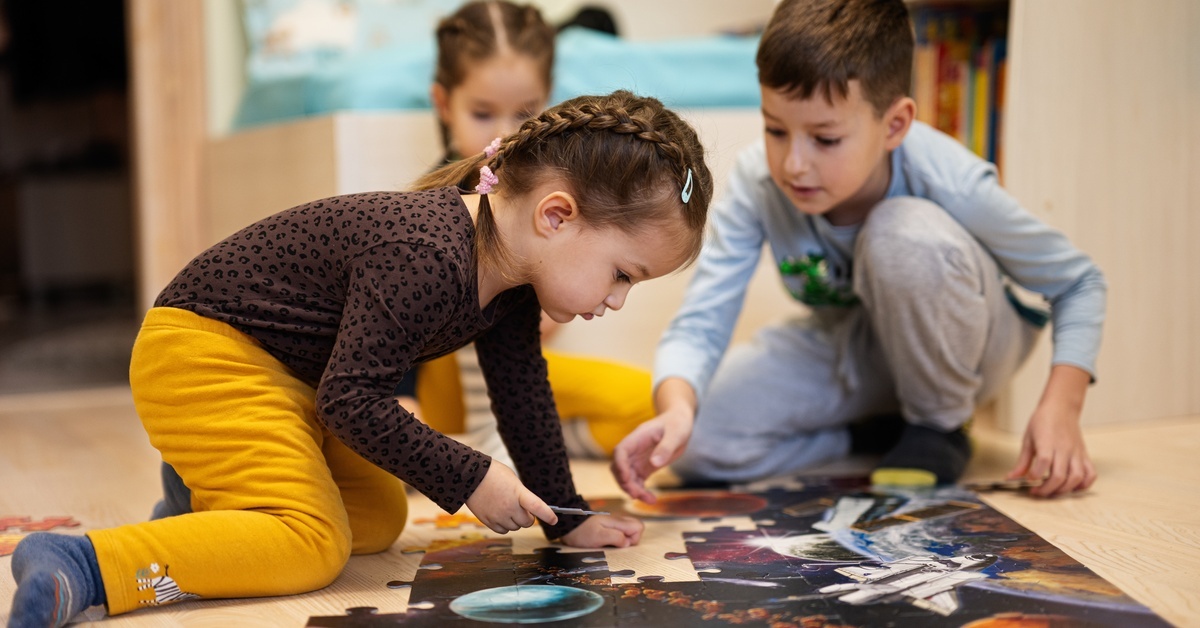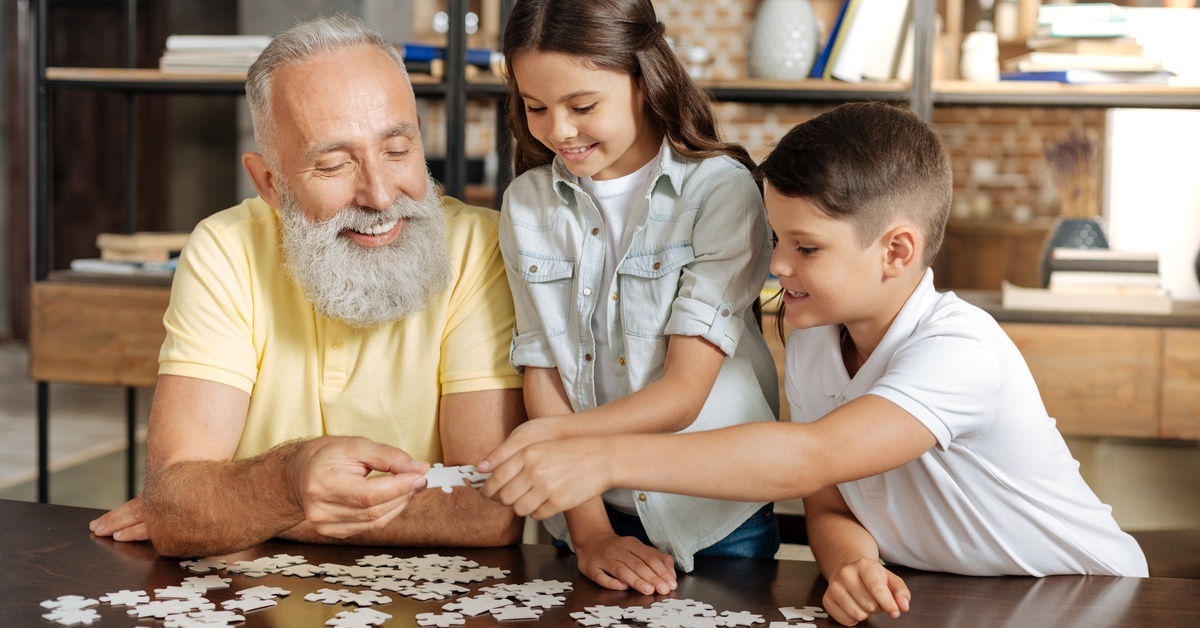Posted by Admin on Sep 26th 2025
How Jigsaw Puzzles Foster Creativity and Focus in Kids
The best way to spend time with your kids is by engaging with them during playtime and teaching them new things about the world. Jigsaw puzzles foster creativity and focus in kids as they build an image using critical thinking and motor skills. To challenge your little ones and participate in a fun, family-friendly activity, learn more about jigsaw puzzles ahead.
Mental Development Shapes Young Minds
Jigsaw puzzles are a fantastic way to give your child’s brain a workout. Through hands-on problem-solving, puzzles help strengthen important cognitive skills like focus, memory, and spatial reasoning. They’re an entertaining way to keep your children busy with a fun activity the whole family can enjoy.
Children naturally develop problem-solving abilities when they work with jigsaw puzzles as they learn to analyze shapes, colors, and patterns while determining where each piece belongs within the larger picture. This process teaches them to approach problems systematically, which builds confidence in their ability to find solutions through persistence and careful consideration.
Working with jigsaw puzzles also improves children’s memory capabilities, as kids must remember the overall image while focusing on individual sections. Without looking at the box or a guide, they recall which pieces they have already tried in specific locations and remember successful strategies for future puzzle attempts. This mental exercise builds neural pathways that benefit academic performance and daily life activities.
Concentration and Focus Development Through Puzzle Play

Jigsaw puzzles provide a rewarding way to encourage deep concentration. By working through each piece, your child takes on a structured activity that naturally builds their ability to stay engaged and see a challenge through to the end.
Children who regularly play with jigsaw puzzles often demonstrate improved attention spans across various activities. Kids learn to ignore external distractions and instead focus on their current objective, which are skills that transfer directly to classroom learning and homework completion.
Plus, when your child focuses on fitting together each piece, they’re practicing being fully present in the moment. This kind of attention helps them tune into their surroundings and their own thoughts to create a calming, mindful experience. Over time, stronger mindfulness can reduce anxiety, improve emotional balance, and even build self-awareness.
Stress Relief for Anxious Minds Through Puzzle Play
Jigsaw puzzles offer a simple yet effective way to help anxious children manage stress. For kids who struggle with transitions or change, puzzles offer a comforting sense of structure. Having a clear beginning, middle, and end can make children feel grounded.
One of the key benefits of puzzles is how they promote mindfulness. When children work on a puzzle, they focus on matching colors, shapes, and patterns, which helps quiet their racing thoughts. The simple act of touching and moving the pieces helps kids stay grounded in their thoughts, which makes it a comforting activity for those feeling overwhelmed.
Jigsaw puzzles also provide a sense of accomplishment that builds confidence and reduces stress. Completing even a small section boosts your child’s self-esteem and gives them a positive outlet to channel their energy. Whether it’s quietly working alone or with loved ones, puzzle time can become a relaxing ritual that helps your child reset and unwind.
Creative Expression Flourishes During Puzzle Activities
Aside from drawing or painting, creativity encompasses thinking outside the box and finding new ways to solve problems. Jigsaw puzzles are a fantastic way to help your child develop visual-spatial skills.
As they work on puzzles of different difficulty levels, your little ones start recognizing patterns, figuring out how pieces fit together, and visualizing how each one contributes to the bigger picture. These skills aren’t just handy for puzzles; they promote successful developments in subjects like math, science, engineering, and even the arts.
Also, puzzles build imagination through story creation. Many children’s jigsaw puzzles depict their favorite stories, movies, and TV shows, with notable characters and scenic backgrounds. This kind of engagement can foster creative storytelling and language development while keeping children excited and entertained.
Motor Skill Advancement Through Hands-On Manipulation
Hands-on activities like jigsaw puzzles foster creativity and focus in kids, especially for toddlers and younger children who are developing motor skills and hand-eye coordination. The precise movements needed to pick up and place each piece strengthen the muscles in your little one’s fingers and improve their coordination.
Textured jigsaw puzzles also add a sensory element that allow kids to explore different surfaces. These skills will help them manage tasks like writing, drawing, and many other activities they’ll use every day at school and at home.
Hand-eye coordination is one of those skills kids develop without even realizing it, and puzzles are a perfect way to help them improve. Guiding each piece into just the right spot teaches children how to connect what they see with how they move. It’s a skill that comes in handy for everything from sports and art to everyday tasks at school, and increasing the puzzle difficulty over time keeps kids learning and growing.
Social Skills Building Through Collaborative Puzzle Solving

Jigsaw puzzles create excellent opportunities for social interaction and collaborative learning when families work together on abstract images or larger puzzles. These shared experiences build communication skills and strengthen family relationships through cooperative achievement.
For instance, children learn to articulate their thoughts and ideas clearly when discussing puzzle techniques with family members. They practice asking questions, offering suggestions, and explaining their reasoning while working toward common goals. These talks build confidence in social situations and improve verbal expression abilities that benefit academic and personal relationships.
Also, working on large or complex puzzles with family members teaches children valuable teamwork skills. They learn to share responsibilities, respect different working styles, and celebrate collective achievements rather than individual success alone. These collaborative experiences prepare children for group projects in school and cooperative relationships throughout their lives.
Choosing puzzles that match your child’s development is a great way to ensure they learn while having fun. For younger kids, puzzles with big pieces, bright colors, and familiar themes they recognize are perfect for keeping them engaged and supporting their learning. As they grow, you can introduce puzzles with more pieces, intricate designs, or more subtle color patterns to keep challenging their skills.
Start shopping for your little ones by browsing our jigsaw puzzles at Yeager’s Sporting Goods and Marina. Along with our family-friendly outdoor activities, we offer kids’ toys online that will challenge your children’s mental and motor skills in entertaining ways. To learn more about our products, visit our website today!

